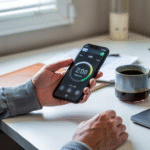When everything around you feels unpredictable, the most reliable place you can turn to… is within.
But what if you’ve lost that trust in yourself? What if uncertainty makes you second-guess your choices, your direction, even your worth?
Self-trust isn’t about always having the right answers. It’s about knowing you’ll navigate whatever comes, one step at a time. It’s not about control—it’s about confidence in your capacity to respond.
In this article, we’ll explore how to build (or rebuild) that trust in yourself—even when the future feels unclear.
What Does It Mean to Trust Yourself?
Trusting yourself means:
- Believing that you’ll show up for yourself
- Knowing that you can handle discomfort and uncertainty
- Respecting your intuition, boundaries, and values
- Giving yourself grace when things don’t go as planned
It’s not about being perfect. It’s about being grounded in your own voice—even when others are loud.
Why We Lose Self-Trust in Uncertainty
- Constant change triggers fear and overthinking
- We seek answers outside of ourselves (validation, opinions)
- We try to control everything to avoid discomfort
- We equate mistakes with failure, not feedback
- We confuse fear with truth
The good news? Self-trust is a skill. And it can be strengthened.
1. Listen to Your Inner Voice (Not Just Outer Noise)
In uncertain times, everyone has advice. But not all of it fits you.
Start asking:
- What do I need right now?
- What feels true for me?
- What decision would I make if I fully trusted myself?
The answers are usually quieter than the noise—but they’re there.
2. Build Daily Evidence That You’ve Got You
Each time you show up for yourself, you build trust.
Try:
- Following through on small commitments
- Taking action even when unsure
- Being honest about your needs
- Keeping boundaries—even when it’s uncomfortable
Every small act is a message to yourself: I’ve got you.
3. Detach From Needing Certainty
Control is comforting, but it’s an illusion. Trust doesn’t mean knowing how things will unfold—it means knowing you’ll face it when it does.
Repeat to yourself:
- “I don’t know what will happen, but I trust myself to meet it.”
- “Uncertainty is part of growth.”
Your nervous system will begin to follow your words.
4. Use Past Evidence as Fuel
Reflect on your history:
- When have I handled uncertainty well before?
- What helped me get through it?
- What strengths did I lean on?
You’ve survived 100% of your hardest days so far. That counts.
5. Practice Self-Compassion, Especially When You Struggle
Self-trust doesn’t mean always feeling strong. It means staying with yourself when you’re scared, tired, or unsure.
Say:
- “I’m allowed to feel this.”
- “I don’t need to have it all figured out.”
- “I can move forward gently.”
Softness builds more trust than pressure ever will.
6. Take One Step, Not All the Steps
You don’t need the full plan—just the next right step.
Ask:
- What’s one thing I can do today?
- What’s within my control?
- What would my future self thank me for?
Action builds momentum. And momentum builds belief.
Final Thoughts: Anchor Inside When the Outside Shifts
You don’t need to predict the future to trust yourself. You just need to keep listening, choosing, adjusting, and showing up for yourself with honesty and care.
Because the world may shift. Plans may change. But your relationship with yourself? That can remain steady.
And from that steady place, you’ll find the strength to face whatever comes next—with clarity, courage, and quiet confidence.

Daniel Carter believes that small daily changes lead to extraordinary results. Through simple and effective strategies, he inspires readers to take control of their routines, overcome procrastination, and unlock their full potential.











